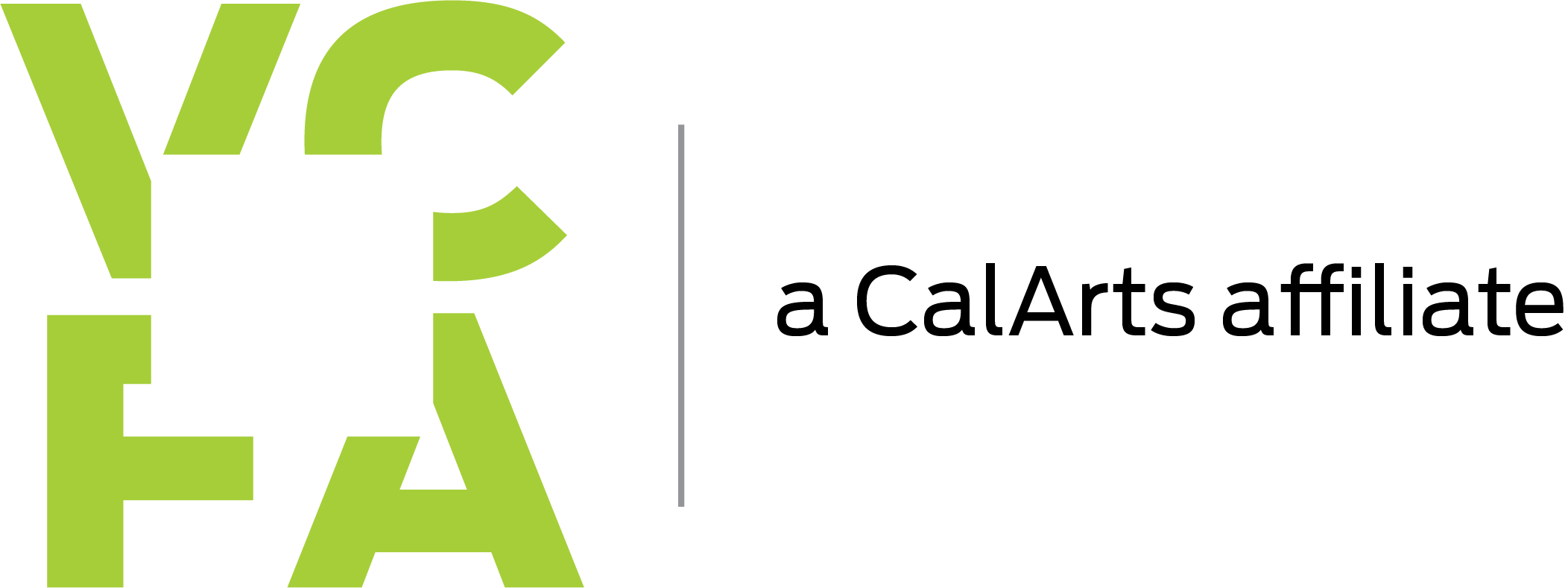Meet VCFA’s 2024 Center Fellows
VCFA’s Center for Arts + Social Justice is thrilled to announce the recipients of our 2024 Individual Fellowships and Community Engaged Fellowships.
Individual Fellowship Recipients
Hannah Ban, MFA in WCYA, ’24
Joor Baruah, MFA in Film, ’24
Shannon Cleere, MFA in Visual Art, ’24
Beste Filiz, MFA in WCYA, ’25
Christine Hartman Derr, MFA in WCYA, ’24
Alexis Powell, MFA in WCYA, ’24
Community Engaged Fellowship Recipients
Jonathan Jackson, MFA in Film, ’25
Chris Lange, MFA in Graphic Design, ’24
B.K. Zervigón, MFA in Music Composition, ’24
The Center’s Fellowship program was created to support and promote the work of current VCFA students that demonstrates a commitment to social justice and social change. Recipients of the Center’s Individual Fellowships receive an award of $2,000 in support of in-progress work that demonstrates the intersection of art and social justice. Recipients of the Center’s Community Engaged Fellowship receive an award of $5,000 to support work that exists in collaboration with an existing nonprofit organization, agency, or other collective on a project with mutually-beneficial outcomes.
In addition to receiving their award, Fellows engage in monthly meetings, networking opportunities, and a dedicated platform at VCFA residencies to share their work.
Learn more about our Fellows and their Center-supported work below, and visit the Center site to learn more about how you can support the Center for Arts + Social Justice.
Meet our Individual Fellowship Recipients
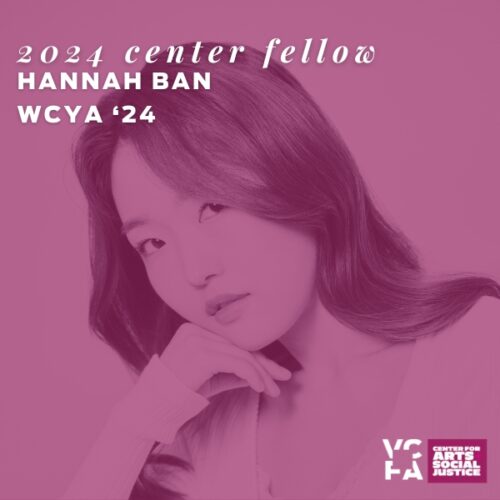
Hannah Ban
MFA in WCYA, ’24
Second-Hand follows 18-year-old Duri Lee, who creates an online persona to manage an archive of old love letters. Growing up with a single mother and a single grandmother, Duri finds comfort in reading about real-life romance, even if it ended in heartbreak. Set in the United States and South Korea, the novel deals with the prevalence of alcohol abuse and the stigmatization of single parenthood in Korean culture. Through amassing letters, Duri not only unveils the secrecy surrounding her father’s identity, but also her family’s intergenerational trauma stemming from sexual slavery during World War II.
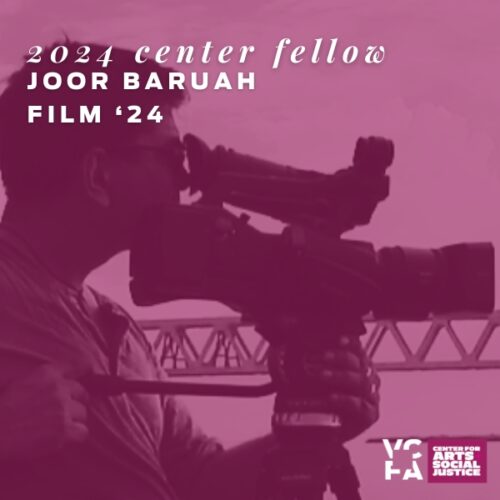
Joor Baruah
MFA in Film, ’24
THE VOYAGE is a documentary film anchored at the first African American Yacht Club, The Seafarers Yacht Club (SYC) on the Anacostia river in Washington DC, and will weave narratives and themes of socio-environmental injustices that existed and still exist very close to the epitome of world power, The White House. Baruah aspires to involve the SYC community and boaters and enhance their sense of belonging, urging them to celebrate the generational resilience in their communities. Baruah would like the film to engage academics, researchers, policy makers, politicians, activists, corporations, and the public to contribute towards social and environmental justice themes portrayed through the story.
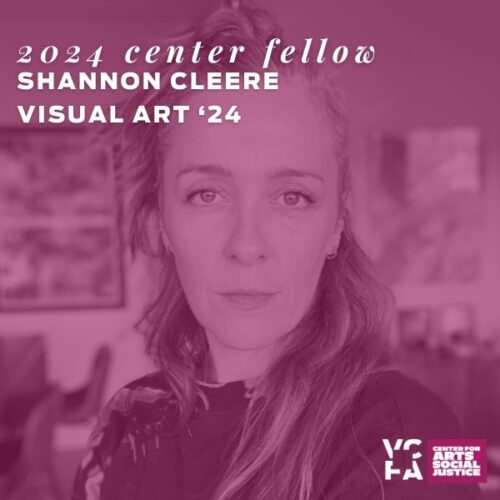
Shannon Cleere
MFA in Visual Art, ’24
Dirty clothes strewn across the floor, a sink teeming with dishes bearing the remnants of last night’s dinner, and a bathtub coated in soap scum and hair—these scenes resonate with anyone responsible for the upkeep of their home, and will for many, undoubtedly, ignite feelings of dread. The work never ends. Domestic labor, relentless and unavoidable, is essential to the well-being of families but also indispensable to the functioning of the world’s economies. Disproportionately conducted by women, unpaid domestic labor is the supporting framework on which American capitalism sits.
However, in the United States, there is a blatant disregard for the value of domestic labor. Parents are not provided with government-subsidized assistance; no guaranteed paid parental leave, no universal healthcare, and no state-subsidized childcare exists. Individuals with families are left to navigate these challenges independently, to fend for themselves. As Angela Garbes, author of Essential Labor: Mothering as Social Change, stated during her talk with Terry Gross on Fresh Air, “America doesn’t have a social safety net; America has mothers.” >>Read More
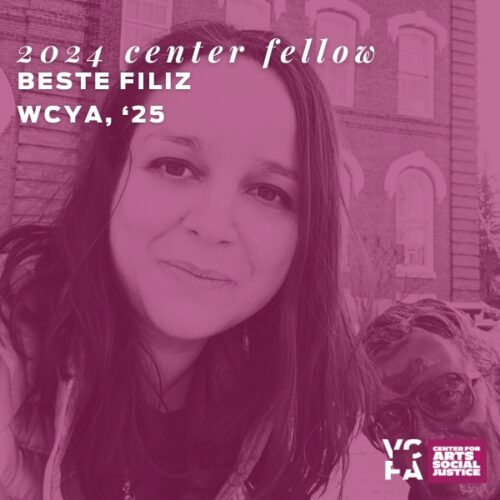
Beste Filiz
MFA in WCYA, ’25
Where Two Continents Meet is a middle-grade novel-in-verse about a girl and her family who become refugees and are forced to flee Turkey and seek asylum in Great Britain. This work is based on the events of Filiz’s childhood. Filiz’s parents and Filiz became refugees when Filiz was three years old. The family fled from Turkey to England because Filiz’s mother spoke out against the Turkish government. Filiz wants to write about refugees and how they contribute to society rather than the stereotypical portrayal of them in much of mainstream media. Filiz wants to give refugees their dignity back in stories for children, especially during this time when there is so much anti-refugee and anti-immigrant rhetoric in the media. Filiz wants to show that political asylum seekers stand up against injustices in their home countries, that they are persecuted for their bravery, and that is why they are forced to leave their homes.
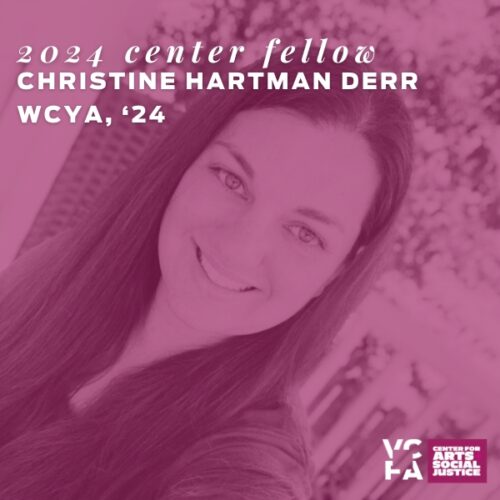
Christine Hartman Derr
MFA in WCYA, ’24
In Kate’s Way Home, a contemporary Cherokee girl finds a connection between her present and her people’s past. This middle grade novel-in-verse follows twelve-year-old Kate as she moves off her reservation for the first time to a suburb in Indiana, where she is far away from her extended family and her familiar tribal connections. As she’s feeling lost and adrift, her faithful canine companion discovers a buried secret: a gravemarker, hidden below the soil of a construction site. The only markings on the gravestone are a first name, a tribal affiliation, and a date. Kate must fight against the clock to solve the mystery of how this Native girl got here, why she’s there, and why a house was about to be built on top of a burial site. Along the way, Kate uncovers the connection between her new town and her Indigenous identity: her new town was once the home to an Indian residential school, one of the many attempts at forced assimilation pushed on Indigenous communities.
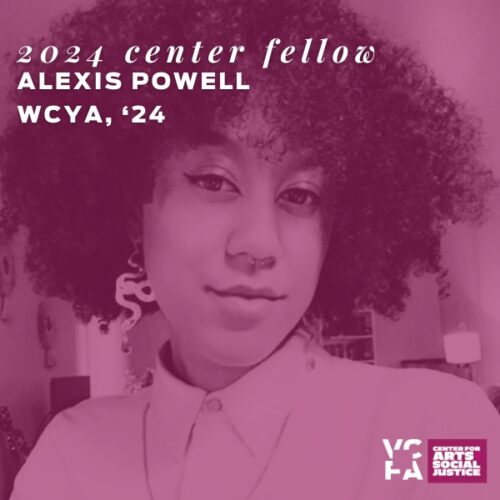
Alexis Powell
MFA in WCYA, ’24
In Carving Space, Logan is a thirteen-year-old Black boy who loves to sit on the shore and watch his talented older brother Dylan catch waves. Dylan is one of the best surfers in San Diego, and he wins competitions all over the country until he quits out of the blue and refuses to tell anyone why. Logan discovers it’s because of something white surfers said to Dylan during an altercation out on the water. Logan, who is generally clumsy and has no natural talent for surfing, practices to enter a fast-approaching surfing contest to inspire his brother to return to the waves where he belongs. Carving Space is meant to encourage Black kids to not only spend time in nature but also to continually stoke the fire of their passion no matter what anyone has to say.
Meet our Community-Engaged Fellowship Recipients
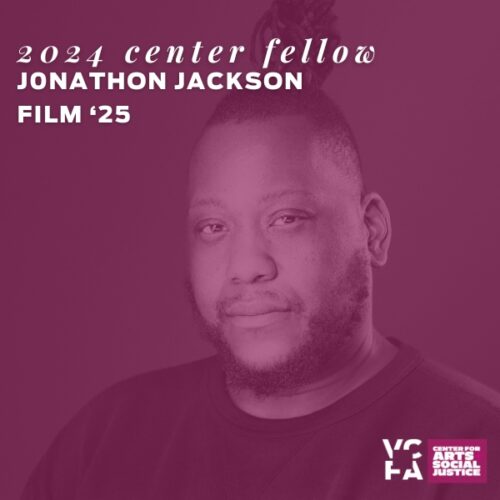
Jonathan Jackson
MFA in Film, ’25
The Black Narratives THE BLACK NARRATIVES, 1618 – 2143
THE BLACK NARRATIVES, 1618- 2143 are a series of short films that explore black life during the Antebellum South without relying on the traditional crutch of trauma. Partially based on the written accounts of ex-slaves and African American folklore, these stories are told through emotions and explore love, fear, pain, heartbreak, hope, acceptance, intelligence, survival, defiance, sexuality, ambition, desire, spirituality, and tradition. These 17 narratives are aimed to comprise an overall arch of black life from the inception of the Trans-Atlantic slave trade to first contact, covering five centuries. The purpose of this exercise in cinema is to see if narratives surrounding enslaved Africans could be told with the replacing images of trauma with hope and nuance while also broadening the horizon of what the evolution of humanity could look like, for better or for worse.
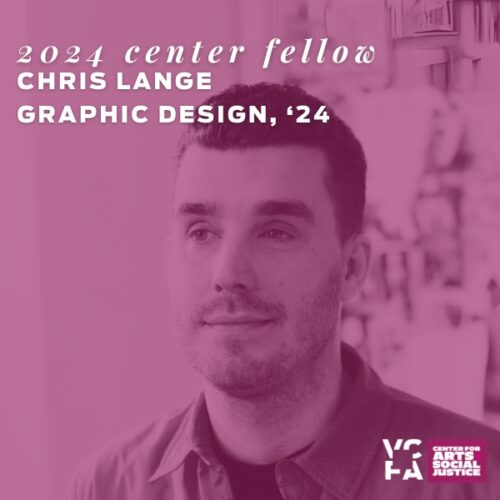
Chris Lange
MFA in Graphic Design, ’24
Just A·S·C!
Chris Lange’s VCFA thesis studies the economic and political power structure behind the growth of monopsonies and monopolies. This has led to the realization that individual agency depends upon independent and community ownership models. Lange is an artist, graphic designer, and teacher focused on community engagement in Toronto, Canada. Lange will be facilitating public and free weekly workshops in public spaces during 2024-2025. These public workshops center around a website he launched called the Anti-Subscription Catalogue (www.a-s-c.org). The A·S·C project advocates for equitable public access to digital tools through open-source, co-operative, and collective ownership models using software that is free, open-source, and a one-time fee—instead of subscription-based. From educational access to digital literacy, Lange is looking to grow A·S·C locally at libraries in the form of workshops that promote a diversity of tools, software, websites, and approaches. Say no to creative rent! Just A-S-C instead.
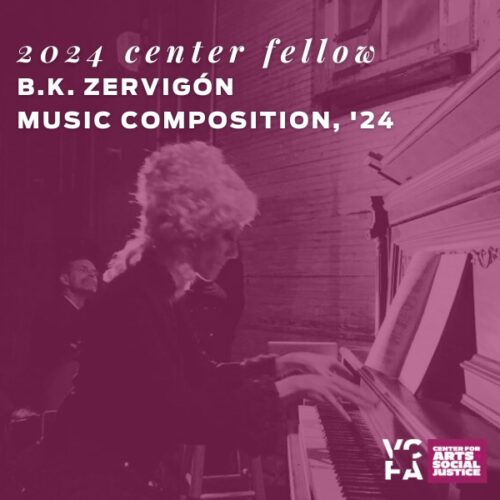
B.K. Zervigón
MFA in Music Composition, ’24
Lineages: How do we learn? How do we inherit?
Presented in collaboration with community-based organizations the Historic New Orleans Collection and the Alluvium Ensemble, spearheaded by composer and current VCFA student B.K.Zervigón, “Lineages” offers a musical survey of New Orleans’s music history to the public. The concert brings together three generations of living New Orleans artists to engage in discourse around what shared musical heritage we as New Orleanians possess. From the Creoles of Color who educated the first generation of jazz greats, to the concert music of the mid-20th century, to the avant garde experimentalism of our fringe communities, New Orleans’ music scene defies easy categorization. Despite this, racial segregation has separated our rich shared culture into false partitions- isolating “jazz” from “classical,” “gig music” from “serious music.” Through deep scholarship in the Historic New Orleans Collection’s extensive archive as well as archival work with local scholars and culture bearers Tyrone Chambers II, Roger Dickerson and Dr. Tara Melvin, Zervigón has helped craft a program that is as rich and provocative as New Orleans. The concert will be followed by a roundtable discussion with our musical Elders as we try to elucidate what that “New Orleans Sound” really is and how we got it.
